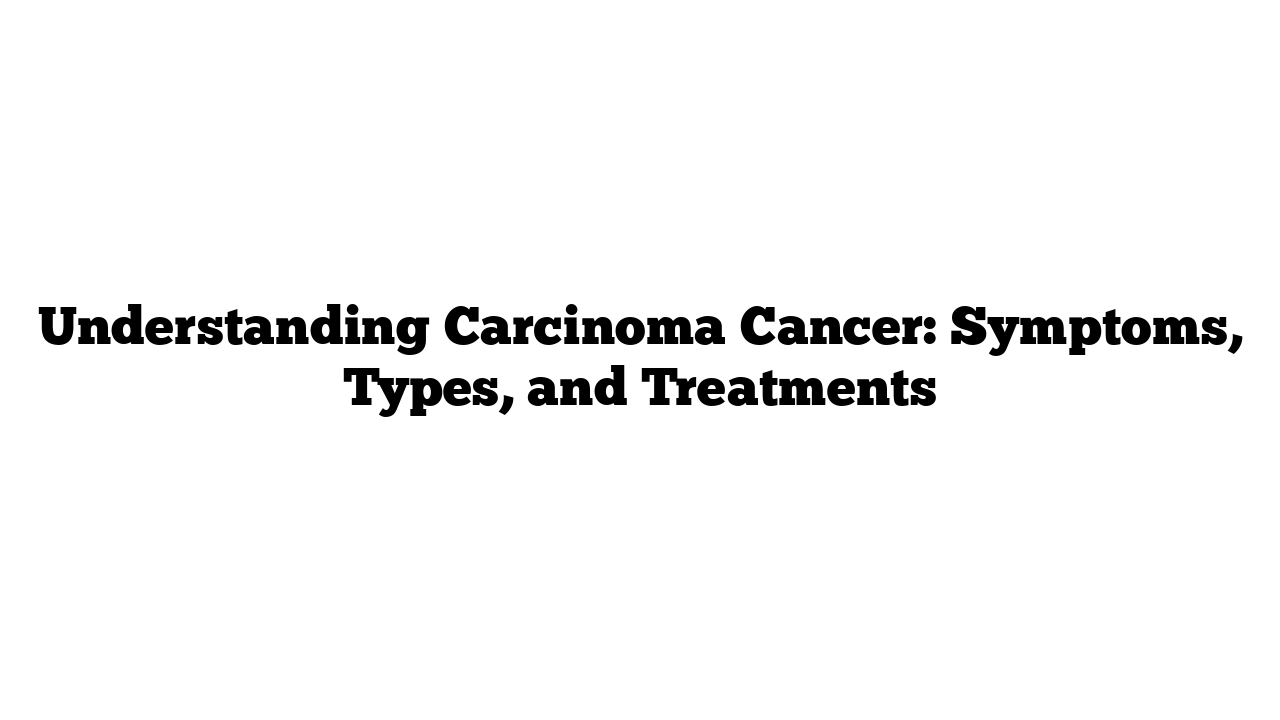Carcinoma Cancer: A Detailed Guide
Carcinoma is one of the most common forms of cancer, originating in the epithelial cells that line various organs and tissues. It can occur in multiple parts of the body and, if left untreated, may spread to other areas. This article explores the types, symptoms, causes, and treatments for carcinoma cancer, written with a doctor’s insight for clarity and trustworthiness.
What Is Carcinoma Cancer?
Carcinoma is a type of cancer that develops in epithelial cells, which form the outer layer of organs, glands, and skin. These cancers are malignant, meaning they can invade nearby tissues and spread to other parts of the body (a process called metastasis).
Carcinoma is common in the USA, affecting millions of people annually. While some types are aggressive, early detection improves the chances of successful treatment.
Types of Carcinoma Cancer
Carcinoma can occur in various locations. Here are the main types:
1. Basal Cell Carcinoma (BCC)
- The most common type of skin cancer.
- Occurs due to long-term sun exposure.
- Rarely spreads but can damage nearby tissues.
2. Squamous Cell Carcinoma (SCC)
- Another type of skin cancer but can also affect other organs.
- Often caused by UV exposure or tobacco use.
3. Adenocarcinoma
- Develops in glandular cells that secrete mucus or fluids.
- Commonly found in the lungs, colon, breast, and prostate.
4. Transitional Cell Carcinoma
- Affects the urinary system, particularly the bladder.
- Smoking and exposure to industrial chemicals increase the risk.
5. Renal Cell Carcinoma
- Originates in the kidneys.
- Often detected during routine imaging for other conditions.
6. Ductal and Lobular Carcinoma
- Found in breast tissues.
- Ductal carcinoma originates in milk ducts, while lobular carcinoma begins in milk-producing glands.
Symptoms of Carcinoma Cancer
Symptoms vary based on the type and location of the carcinoma. Watch for these general warning signs:
- Unexplained lumps or swelling.
- Changes in skin appearance, such as sores that don’t heal.
- Persistent cough or hoarseness (lung or throat carcinoma).
- Changes in bowel or bladder habits (colon or bladder carcinoma).
- Unusual bleeding or discharge.
- Unexplained weight loss or fatigue.
Early signs can be subtle, so it’s crucial to consult a healthcare provider if these symptoms persist.
Causes and Risk Factors
Carcinoma is caused by genetic mutations in epithelial cells, leading to uncontrolled growth. While the exact cause isn’t always clear, certain factors increase the risk:
1. Lifestyle Choices
- Smoking: A leading cause of lung and throat carcinomas.
- Alcohol consumption: Increases the risk of liver and throat cancers.
2. Environmental Factors
- Sun exposure: A major cause of basal and squamous cell carcinomas.
- Exposure to chemicals: Workers in certain industries face higher risks of carcinoma.
3. Genetic Factors
- A family history of carcinoma increases susceptibility.
4. Infections
- Human Papillomavirus (HPV): Linked to cervical and throat carcinomas.
- Hepatitis B and C: Associated with liver carcinoma.
Diagnosis of Carcinoma Cancer
Doctors use various methods to diagnose carcinoma:
- Physical Examination: Checking for visible changes, such as skin lesions or lumps.
- Imaging Tests: X-rays, CT scans, MRIs, or PET scans to identify abnormal growths.
- Biopsy: A tissue sample is analyzed under a microscope to confirm cancer.
- Blood Tests: Used to detect markers for specific cancers, like liver carcinoma.
Treatment Options for Carcinoma Cancer
The treatment for carcinoma depends on its type, location, and stage.
1. Surgery
- Removes tumors and affected tissues.
- Often the first step for localized cancers.
2. Radiation Therapy
- Uses high-energy beams to destroy cancer cells.
- Common for skin carcinomas or as post-surgical treatment.
3. Chemotherapy
- Systemic treatment using drugs to kill cancer cells.
- Effective for carcinomas that have spread.
4. Immunotherapy
- Boosts the body’s immune system to fight cancer.
- Especially effective for advanced lung and kidney carcinomas.
5. Targeted Therapy
- Focuses on specific molecules in cancer cells, sparing healthy cells.
6. Hormonal Therapy
- Used for hormone-sensitive cancers like breast carcinoma.
Preventing Carcinoma Cancer
While not all cases are preventable, these tips can reduce your risk:
- Avoid tobacco and limit alcohol intake.
- Use sunscreen with SPF 30 or higher to protect your skin.
- Get vaccinated against HPV and hepatitis B.
- Maintain a balanced diet and healthy weight.
- Stay physically active to boost immunity.
- Regular screenings for at-risk populations, especially in the USA, where healthcare programs support early detection.
For more tips on prevention and treatment, visit medicaltimes.io.
Carcinoma Cancer and the USA
In the USA, carcinoma accounts for a significant number of cancer diagnoses each year. The prevalence of lifestyle-related risk factors, like smoking and UV exposure, has increased the burden of this disease. Public awareness campaigns and accessible healthcare services have played a key role in early detection and management.
Top 10 FAQs About Carcinoma Cancer
1. What is carcinoma cancer?
Carcinoma is a cancer type that begins in epithelial cells, affecting organs like the lungs, skin, and breasts.
2. How is carcinoma diagnosed?
Through physical exams, imaging tests, and biopsies.
3. Is carcinoma cancer curable?
Many types are curable if detected early.
4. What is the most common type of carcinoma?
Basal cell carcinoma, a form of skin cancer, is the most common.
5. How can I prevent carcinoma?
Avoid smoking, use sunscreen, and get vaccinated for HPV and hepatitis B.
6. Are all carcinomas aggressive?
Not all. Some, like basal cell carcinoma, grow slowly and rarely spread.
7. Can carcinoma spread to other parts of the body?
Yes, it can metastasize if not treated.
8. Who is at higher risk for carcinoma?
Smokers, people with prolonged sun exposure, and those with a family history.
9. Are treatments painful?
Some treatments may cause discomfort, but pain management options are available.
10. How does HPV relate to carcinoma?
HPV is linked to cervical and throat cancers. Vaccination reduces the risk.
